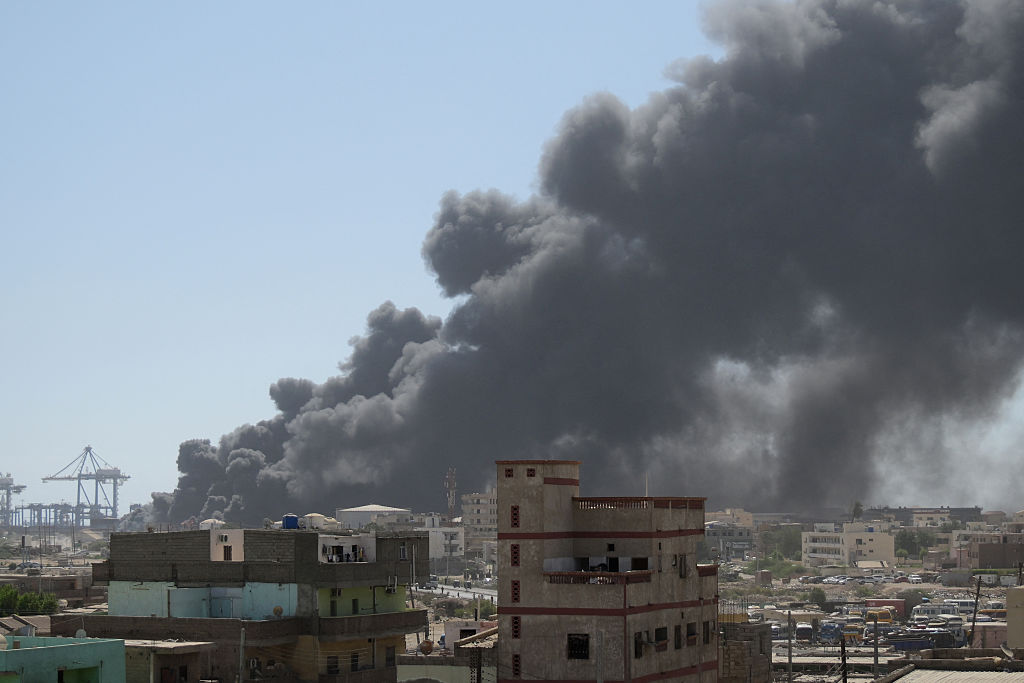Recent drone attacks in Darfur and Port Sudan were part of rising tensions between Turkey and the United Arab Emirates (UAE) as they try to influence the outcome of Sudanese war, according to experts.
Turkey has provided the Sudanese Armed Forces (SAF) with Bayraktar TB2 drones and Turkish operators. The UAE repeatedly has denied backing the paramilitary Rapid Support Forces (RSF). However international monitors have reported Emirati aircraft arriving at a Darfur airstrip. They also say materiel is being smuggled in from an UAE-built airstrip in Chad, Emirati air bases in Uganda and Somalia’s Puntland region, and from UAE-backed forces in Libya.
Turkey’s drones have helped turn the tide in the SAF’s favor. Since receiving the Bayraktar drones in December 2024, SAF fighters have driven RSF fighters out of key territory in eastern Sudan and the capital region.
In May, the SAF destroyed a UAE cargo plane on the runway in Nyala, the capital of RSF-controlled South Darfur. The attack came after SAF forces observed similar military planes flying to and from the same airport for several months.
The attack killed dozens of RSF fighters, several Emiratis and the plane’s pilots. SAF officials say the flight was part of an ongoing UAE campaign to supply RSF fighters and prolong the war.
In retaliation for the Nyala attack, drones believed to have been launched from RSF territory in Darfur bombarded Port Sudan for days, setting oil facilities ablaze and damaging a power station and the port.
The attack also damaged military hangars believed to hold the Bayraktar drones and injured several Turkish drone operators. Turkey flew the drone operators to Turkey for treatment.
The RSF did not claim responsibility for that attack, leading some analysts to suspect that the UAE directed it in response to Turkey’s involvement in the Nyala attack.
Shortly after the Port Sudan attacks, Sudan’s ambassador to the United Kingdom, Babikir Elamin, told the U.K. Parliament that the drone assault raised the potential for Sudan’s internal conflict to become a regional one.
“Until recently, this conflict could be described as a proxy war. However, it has taken a dangerous turn, verging on a regional war, with the UAE’s barely concealed direct intervention,” Elamin said.
The tension between Turkey and the UAE in Sudan echoes the tensions that flared between the two countries in 2020 when Turkey backed Libya’s internationally recognized Government of National Accord (GNA) against the UAE-sponsored Libyan National Army (LNA) led by Field Marshal Khalifa Haftar.
Turkey’s aid helped the GNA turn back an LNA assault on Tripoli that same year. About 3,000 Turkish troops remain in Libya.
In April, Turkish military leaders met in Ankara, Turkey, with Saddam Haftar, chief of the LNA’s ground forces. Meanwhile, observers say, the UAE has shifted from direct military involvement in Libya to a more subtle attempt to influence the country through religious and social institutions.
In Sudan, the UAE maintains a decadeslong relationship with the RSF and its leader, Gen. Mohamed Hamdan “Hemedti” Dagalo. That relationship has been built on a foundation of gold extracted from mines owned by Dagalo’s family and smuggled to the UAE, where Hemedti keeps his finances.
According to data from the Central Bank of Sudan, the vast majority of the country’s exports between 2018 and 2022 went to the UAE in the form of gold. During that period, the value of those exports more than doubled from $994 million to more than $2 billion.
“In this war, UAE is on the winning side, anyway. The longer the war goes on, the higher the profits rise,” analysts with the website Monitor Control wrote earlier this year. “For UAE, it is a good idea to keep the war going.”
For Turkey, involvement on the side of Sudan’s internationally recognized government is part of an effort to expand its influence as a peacemaker and power broker.
“Turkey’s involvement in Sudan aligns with Ankara’s broader regional strategy,” analyst Mustafa Enes Esen wrote earlier this year for the Institute for Diplomacy and Economy. “An understanding between the leaders of the SAF and the UAE in Ankara-mediated talks could bring the civil war in Sudan to a swift conclusion.”
In the meantime, it’s unclear when either side in Sudan will decide the fight is no longer worth the effort, analyst Simon Marks said during a recent edition of Bloomberg’s “Next Africa” podcast.
“If proxies continue to fuel it (the war), it could go on and on and on,” Marks said.

